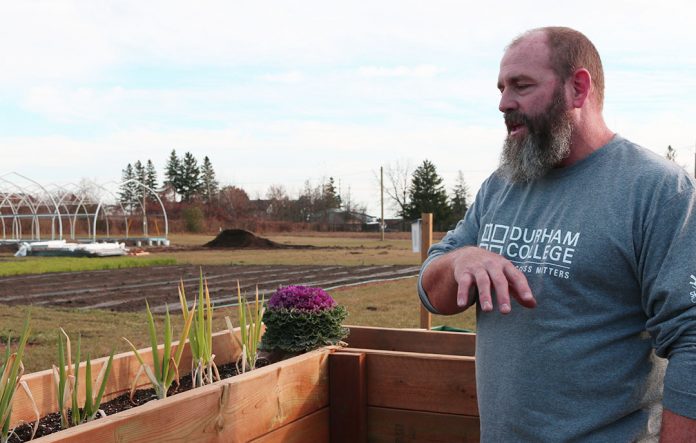Durham College is raising awareness about food security and where food comes from through its two urban farms.
The Barrett Centre of Innovation in Sustainable Urban Agriculture opened this fall in Ajax at the intersection of Harwood and Rossland Roads.
The physical farm demonstrates what people can do in their own environments. The farm also shares its research with the rest of the world through an online portal.
Kelly O’Brien, the associate dean of the Hospitality and Horticultural Sciences, looked at many potential sites in the Durham Region.
The Ajax site fit many requirements such as being accessible, being in a space where Durham College could engage with the community and being close to two high schools: J. Clarke Richardson Collegiate and Notre Dame Catholic Secondary School.
The land is actually reserved for an eventual water treatment facility and, while Durham Region is not sure if it will ever use the space, Durham College has it for five years.
Currently, only half of the centre is farmed. “Realistically, it’ll take a number of years before the biologicals in the soil are lost, before it’s truly a living soil again,” said farm manager, Shane Jones.
At the moment, there are passive solar hoop houses, a hydroponic system, demonstration gardens, and a traditional raised garden. An apiary will also be settled in the farm space as well.
Involving the local community
The demonstration gardens function as the food literacy zone, placed to teach community members how to grow produce in a backyard space and a balcony space.
With two high schools nearby, the centre plans to invite high school students to begin dual credit and co-op courses. Jones said one class already came out and harvested produce to cook in class.
Jones wants younger generations to discover what farming looks like, especially urban farming.
“It’s really not that long ago that we all had backyard gardens or we had a local farmer in our community that we engaged with,” said Jones. “And that provided food back to the community that was living right beside them.”
While the centre is not designed to be a vehicle for curriculum, it hires multiple DC students through DCWorks. Many of these students come from project management, welding, and other programs, according to Brenna Bizley, the partnership manager at the Barrett Centre.
Bizley said the Barrett Centre also partnered with outside organizations as well, such as Community Care Durham, over this last summer to start a mobile market in Ajax and many other non-profits and charities.
Supporting local food
Bizley said the centre hopes to “become kind of the voice of urban agriculture on in the community.”
O’Brien added the goal is about building resilience.
“It’s about having food come from within your communities versus into your community,” said O’Brien. “Not relying on big box stores that are sending produce from California.”
Meanwhile, at the Whitby campus, students head to greenhouses for lessons and sit in on technical math and farm planning classes, while professors plan out next year’s crops.
Before the winter season though, the centre sees students and staff engaging the Whitby community in the fall harvest, food literacy and dinners.
The campus farm boasts aquaponic and hydroponic gardens, an apiary, greenhouses and hoop houses, as well as a post-harvest facility and an orchard.
Teaching field-to-fork
Food literacy is taught through many different approaches at Whitby campus, such as ‘field-to-fork’.
‘Field-to-fork’ encourages buying locally-grown food, not only for economical purposes, but also for nutritional value, according to field supervisor and urban farm manager, Andrew Guay.
To demonstrate this, the farm works with community partners and host farmer’s markets, though most of the crops produced throughout the year are diverted to Bistro ‘67 and the culinary programs.
“It’s really cool, if we time it right, we can harvest things that are ready to go and literally walk it up through the restaurant. And people are watching as I’ve brought a bin from the field,” said Guay.
Alexander Dyton, a DC student and a volunteer on the farm, says the most rewarding part is to “come back later and see them like all grow, because our farm out there looks pretty beautiful in the summer and even into the fall.”
Focusing on sustainability
Along with food literacy, the goal of the W. Galen Weston Centre is sustainable agricultural practices, a concept they are still improving on.
Guay says sustainability is seen through an ecological perspective and an environmentally-conscious lens at the farm.
“For example, I am in the midst of planning out a new irrigation system because our current irrigation system uses single use drip tape,” says Guay. “And every year I have to throw out thousands of yards of drip tape into the garbage and it feels like an absolute waste.”
Along with the winter preparations, the urban farm is undergoing construction to build a therapy garden with the help of current and graduated students.




